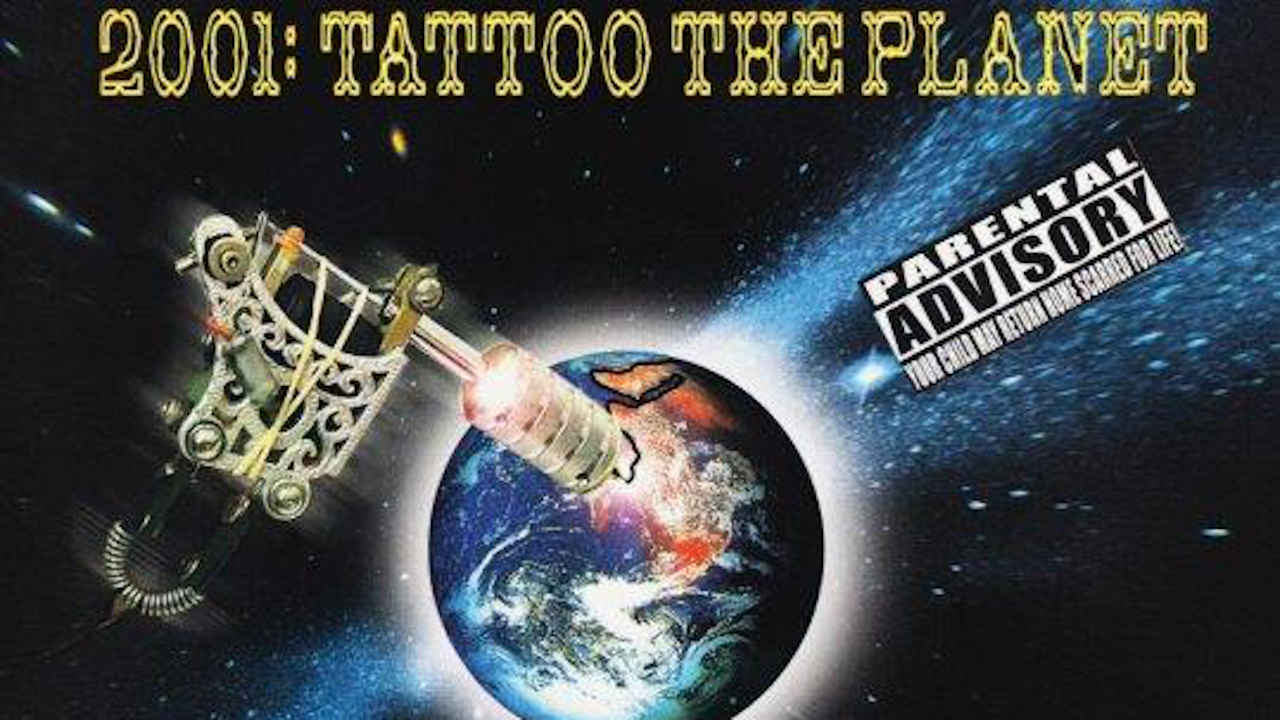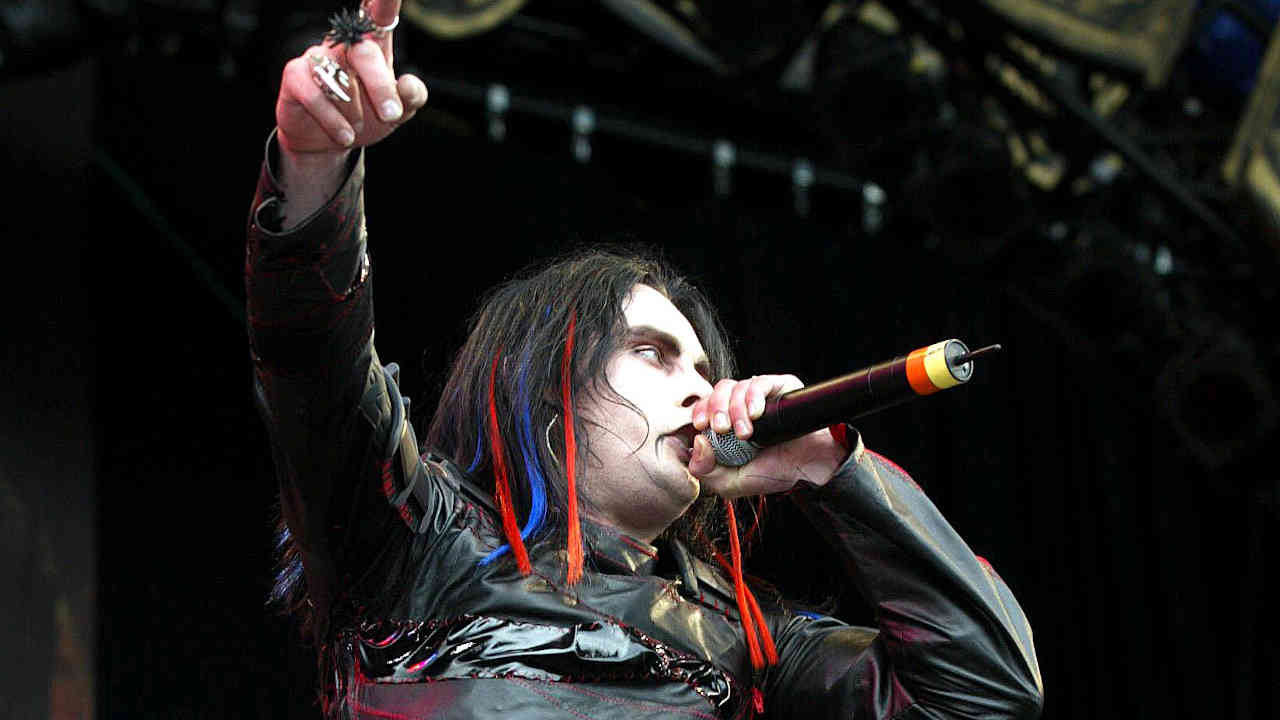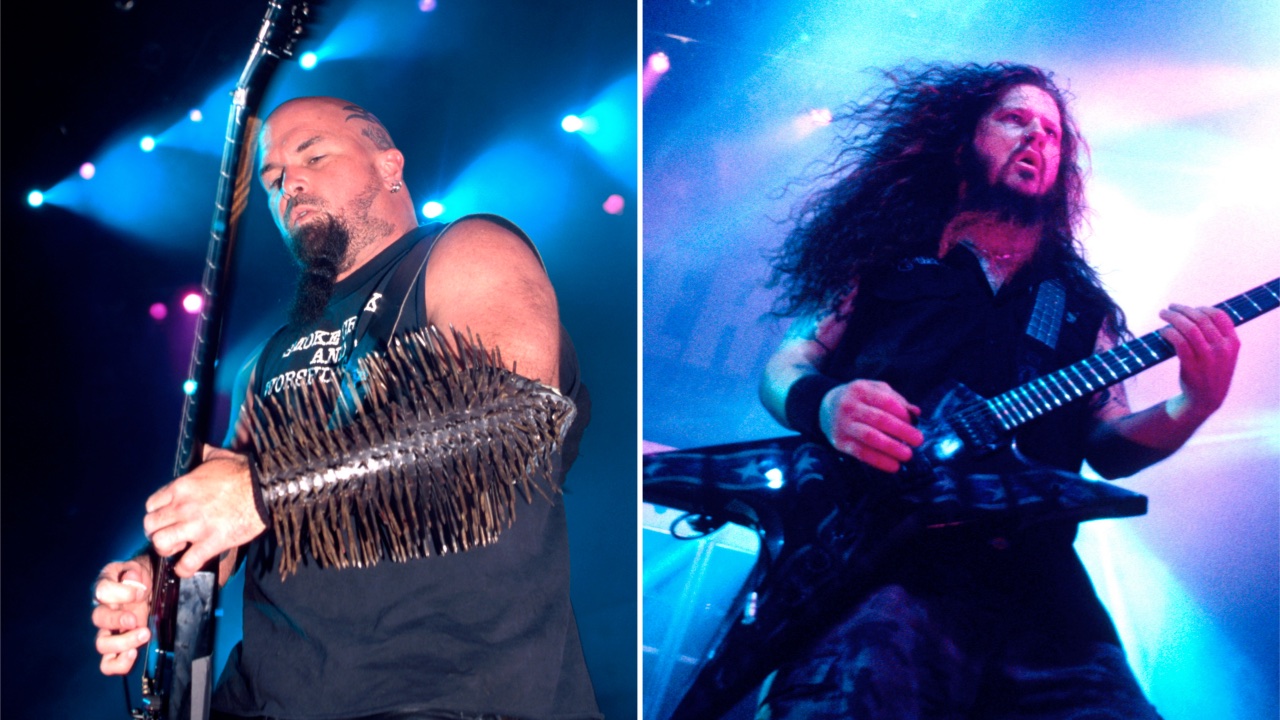The mid-90s to the early 00s was a fallow period for UK metal festivals. It was the aftermath of Monsters Of Rock at Donington Park, and before the same site was reclaimed by metalheads for Download. There was the odd Ozzfest, a few metal bands sprinkled across the stages of Reading and Leeds… but that was about it, until 2001, when a new contender entered the arena: Tattoo The Planet. It promised a day-long experience packed to the brim with the best metal bands of the time.
Only, it didn’t go to plan. Instead, 9/11, threw the whole thing into chaos. Headliners cancelled, bands were spooked, dates were moved, and chairs were thrown though tour bus windows. This is the story of Tattoo The Planet – the greatest metal festival the UK never saw.
The idea for Tattoo The Planet was imported from the States. In the year 2000, US promoter Scott Alderman released a statement announcing a brand-new, 30-date US touring festival named Tattoo The Earth, set to begin in July. ‘Nothing represents youth culture like music and body art,’ it read. The headliners would be confirmed as Slipknot and Slayer, alongside the likes of Coal Chamber, Soulfly and Sevendust, plus a group of renowned tattooists.
While the initial run was somewhat chaotic, with numerous bands jumping ship to Ozzfest, it attracted attention from the other side of the Atlantic. UK promoter Mags Revell, who ended up helping to shape Download a few years down the line, decided to make the trip to see it for himself, and thought it had the potential to work in Britain.
“I went along and I liked it,” he tells us. “I had a chat about bringing it over to the UK, and, I don’t really want to get into this, but they were a bit funny about the name. So, we thought ‘Earth, Planet, World… whatever, it’ll be the bands that make it work’. We decided on Tattoo The Planet, and I went down the road to Camden and took a picture of a tattoo gun and mocked it up on a globe and away we went… we didn’t even have any tattoo artists at that point!”
And so, it was confirmed. Tattoo The Planet would have a European run in 2001, starting in Dublin on September 13. The bill was strong: Cradle Of Filth, Static-X, Biohazard, Vision Of Disorder and Raging Speedhorn would join a closing one-two punch of Slayer and, most excitingly and surprisingly of all, Pantera.
“I had done Pantera’s last UK tour,” says Mags. “I thought you’d never see them over here again, because it had been so tense. So, when we got them confirmed, with Slayer as well… what a bill!”
Slayer’s Kerry King remembers his excitement for the shows. “That was like our rebirth as a band after being kind of aimless in the 90s,” he says. “God Hates Us All was about to come out, which reinvigorated us and was really our blueprint for everything we did in our career after that. So we were desperate to get out and play it to people.”

Then, everything changed. On September 11, 2001, New York City’s World Trade Center suffered the most high-profile terrorist attack in US history. “I was flying out that day,” Kerry tells us. “I woke up that morning and a buddy of mine said, ‘I don’t think you’re going anywhere today.’ Then we saw it. Crazy time. If anything was ever going to make me patriotic then it was that.”
“I remember exactly where I was,” says Tim Williams, vocalist of New York’s own Vision Of Disorder. “On either the 9th or the 10th of September we flew out to Dublin, because we wanted to get there early. We wanted to go party it up. We were on our bus picking up some drums from the rental place, and we were all amped up for this tour! Suddenly, Brendon [Cohen, drums] comes running into the bus and shouts something about planes striking the freaking towers.”
According to Tim, this is where panic set in for the band, knowing that then-guitarist Matt Baumbach’s brother was working in one of the towers. “We saw Matt walking down the street toward us looking like he’d just got off the phone,” Tim continues. “He had a really confused look on his face. We went into the rental place and found a TV, and I don’t think the second plane had even hit yet. Nothing was sinking in yet.”
Luckily, Matt’s brother made it out alive. “He’s got some crazy story about getting out,” Tim nods. “He was on the news, he saved a lot of people’s lives.”
Thousands of others wouldn’t make it out. While the events were playing out in the States and being broadcast across the world to widespread shock and sadness, life in the UK was continuing as normal. “That evening we had Alien Ant Farm playing at the [now- defunct London venue] LA2,” says Mags Revell. “They did the show and I thought, ‘OK, it’s a tragedy, but everything is going to carry on, I guess.’”
Little did he know…
“Pantera were already out there [in the UK],” says Kerry. “They had flown out before the tour. But they decided to come back. It was kind of the end for them as a band, so maybe it was a relief in some way, maybe deep down they didn’t want to do it. But that wasn’t an option for us.”
“We were told that the first night in Ireland was going to be going ahead,” Tim Williams tells us. “But because all the flights had been cancelled, only us and Pantera were there. So, it was just going to be us and Pantera. What a dream! We were sat in this arena on the day of the show, looking at the stage that was set up with Pantera’s gear, and thinking we were about to do this huge thing… then, suddenly, people start coming on and taking their backline down! What the hell was going on?!”
“The Cowboys From Hell,” sighs Mags. “The hardest band in the world… they bottled it.”
Certain members of the tour’s line-up were less than shocked by the decision. “We were tight with the Pantera guys, we knew how they were,” says Billy. “They weren’t too keen on touring outside of the States, they used to bring their own ketchup and Coors beers. They liked what they liked.”
Static-X and Sepultura also withdrew. As they were there, Vision Of Disorder decided they might as well see it through, but even that proved problematic.
“The show was cancelled and then they told us to go somewhere else and the show would be on,” Tim laughs. “Of course we got there and found out that the show had been cancelled. We were following this damn thing around Europe for about a week. In the end, we just had to give up and go home.”
Not for lack of trying, Vision Of Disorder never played any of the dates. Biohazard, another New York band, also wanted to honour their commitment. “We didn’t really sit down and question whether we wouldn’t do the tour,” Billy says. “I had personal thoughts about how not doing the tour, or changing the way we were living, was giving the terrorists another win. There was never a question that we wouldn’t do it.”

The pushback meant that the tour, due to start on September 13 in Dublin, actually started on September 22 in Stuttgart, Germany. “Once it got going, it was a great tour,” remembers Cradle Of Filth frontman Dani Filth. “Yes, a lot of the American bands pulling out might have been a problem, but they were replaced really well, especially in Europe. We had Destruction come join the bill in Germany. It was great!”
In the UK, the tour was rescheduled to start on October 11, propped up by UK artists Napalm Death, Therapy?, Skindred and upcoming Brit metal band Defenestration. “We had just got a new booking agent,” says Defenestration vocalist Jen Tasker. “I remember one day we got the call saying we were going to be doing Wembley Arena. We were just kids, the stage was bigger than most venues we’d played. It was surreal, obviously we were benefiting from this tragedy… but we couldn’t not be excited by the prospect of that.”
As Jen, Dani Filth and Billy will tell us, there was a unique atmosphere backstage at the shows, although all three have radically different memories. Jen remembers being starstruck at seeing members of Slayer walk past, having been “the only band ever to turn up to play Wembley in a Transit van”, whereas Dani mostly recalls having a typically debauched time. “We were just a load of young metalheads letting off steam,” he chuckles. “We had a good time with the Biohazard guys. I think Billy threw a chair through the back of our tour bus window… ask him.”
“Yeah, I think I did do that,” Billy says gingerly. “I was young, my wife was pregnant and we were worried about what was going on at home. So, I did drink a lot and my fuse was pretty short back then; it got me in a lot of trouble. I don’t remember why I did that, but it sounds like me! But you have to remember, there was so much uncertainty, everyone wanted to let off steam because we were so on edge.”
A reported £65,000 was lost on ticket returns, though Mags can’t remember the figure today. But despite the chaos backstage, on the bill and around the world, the shows were often cathartic for those who did play and attend. “There might have been a few returns from people,” Dani scoffs, “but I didn’t see any. All the shows felt pretty full to me, and it was still a great bill.”
“I remember being onstage and feeling the solidarity,” smiles Billy. “I remember someone threw the American flag onstage and we draped it between us and the feeling in the crowd was such an incredible thing. That was a big vibe for us.”
“We didn’t feel any pressure to be Pantera, no,” says Jen. “When we went on, the doors had only just opened, and it was still the biggest crowd we had ever played to. And Slayer were amazing, and we felt really honoured to be there.”
“We needed to play, and our fans needed to see us,” Kerry King tells us.
It might not have gone to plan, but Tattoo The Planet was a fine example of metal’s perseverance in the face of tragedy, and showed there was an audience for large-scale metal shows, laying the foundations for something even bigger.
“I’m proud we went ahead with it,” smiles Mags. “It was one of the best metal line-ups that there ever was, and, yeah, it didn’t pan out the way we wanted it to, but it showed there was an appetite for this music. Thousands of metalheads turning up to Wembley to see Slayer! And a few years later, we had Download. It gave us all confidence to do that and the hunger to put it right – look where we are now.”

